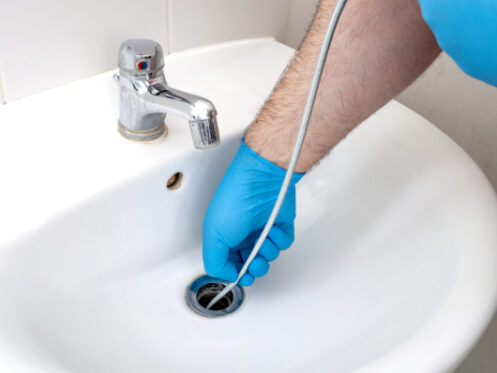Clogged drains are one of the most common plumbing issues. If you notice your drains are moving slowly or backing up, solving the problem can be as simple as snaking the drain. However, if you find yourself repeatedly calling your plumber for help with your drains, it might be worth rethinking your habits. Recurring clogs tend to be a sign that your drains aren’t getting proper maintenance. Luckily, this is an easy issue to fix. Once you learn about the reasons for blocked drains, you can easily take steps to prevent it.
You Put Grease in Your Drains
The most common reason for a clogged sink drain is grease. Though grease is liquid when it’s warm, it eventually congeals. This can lead to disaster for your drains. Even simple acts like frying bacon and then washing a pan can end up causing a clog in your drain. Grease can easily cling to other food particles and build up a solid clog that’s very hard to move.
The only way to avoid this type of clog is to get into the habit of collecting all grease before it gets into your sink. If you frequently fry foods that create liquid grease, try to pour the grease out into a heatproof container before you wash the pan. When grease congeals, use a spatula to scrape grease from your pans. You’ll also need to wipe down dishes that might contain residual grease.
You’re Flushing Sanitary Items in the Toilet
A lot of people assume they can flush hygiene products in the bathroom. However, the reality is that nothing besides toilet paper and bodily waste should be going down your toilet drains. So-called “flushable” wipes can technically go down a toilet drain, but they don’t disintegrate like toilet paper. Over time, they begin to collect and create a clog. Since the recent advent of flushable wipes, this has been an increasingly common cause of blocked drains.
Another potential issue to be aware of is tampons. Many people assume they can flush these items because the industrial drain systems in places like schools can often handle them. However, they still tend to cause damage to your pipes even when they fit down a toilet drain. Since they don’t disintegrate easily, they can easily stick around in your pipes and cause a clog.
Hair is Escaping Down Your Drain
Hair is a common cause of clogs in bathroom sinks and showers. The issue with hair is that it tends to collect in big tangles that trap more and more hair until your drain is entirely blocked. It can twist around drain stoppers until a clog forms. This problem is more common in households where people have long hair, but smaller hairs from shaving can also cause problems.
You can prevent these clogs by avoiding intentionally sending hair down the drain. However, in the typical shower or bath, some hairs will inevitably fall out. If you keep having this issue, you might want to consider a hair catcher. This small device fits over your drain and keeps hair from getting into your pipes.
Your Outdoor Landscaping Is Causing Problems
Another common drain problem that many people aren’t aware of is tree roots or plant roots. Plants can be surprisingly persistent. If they sense moisture, they can send almost invisibly small roots toward pipes. Over time, these roots worm their way into your pipes and start to grow larger and larger. Eventually, many homeowners end up with massive clusters of roots in their drainage lines.
Some homeowners like to regularly send root-killing chemicals down their drain. This can fight off any root infiltration before it causes a clog. However, these chemicals are often dangerous to wildlife and may be banned in certain areas. Furthermore, if you have a septic system, the chemicals can destroy beneficial bacteria in the tank. A more effective solution is to get regular drain inspections that clear away any roots before they become an issue.
Random Items Are Being Flushed Down Your Toilet
If you have kids or pets, there can be all sorts of surprising sources of clogs. Small toys, makeup, coins, and other random items can be chucked in the toilet out of curiosity. Though these items might be small enough to fit down the drain, they can end up wedged in tight spots where they collect more debris and create a clog.
Many parents find it helpful to talk with their children about never putting anything in the toilet. However, if the issue continues, you might want to childproof your toilet with a lock on the lid.
Your Pipes Are Too Narrow
Any time your pipes are too narrow, clogs can form more easily. Especially in older homes, the builder might’ve used pipes that won’t suit the homeowner’s current needs. However, sometimes narrow pipes are due to corrosion. Over time, the inside of pipes can often react with the minerals in water to create pipe scale. This buildup gradually narrows pipes until they’re too small to drain.
There isn’t a fast way to prevent clogs from forming in narrow pipes. Instead, prevention will require you to replace the pipes with a more appropriately sized pipe.
Food Is Going Down Your Drains
If the clog is in your kitchen sink, there is a chance that food is the problem. Even small particles of food that get washed down the kitchen sink can clog your drain. Things that are fibrous, such as steamed spinach or potato peelings, are a common culprit, and sticky, starchy things, like bread, can also be an issue.
Preventing these clogs tends to require a lot of caution. All dishes need to be scraped into the garbage can, and it might be helpful to add a filter to the sink to catch debris. If you have a garbage disposal, use it with caution. Though it can help keep food from clogging your drain, it’s not a guarantee against clogs. Try to only use it with food that disintegrates easily and run a lot of water while using it.
Drain Lines Are Improperly Designed
Drain lines are supposed to slope at an angle where water easily flows away from the house. If they’re tilted the wrong way or have overly tight angles, water can flow more slowly or even pool in spots. When this happens, solid waste can begin to stack up and create a clog.
Poor drain design is often the culprit in a house that gets recurring clogs for no apparent reason. To solve the problem for good, you often have to remove or rearrange the problematic pipes. By redesigning your drain system to meet modern building codes, you can prevent a lot of clogs.
With these tips, it’s often much easier to keep blockages out of your drains. However, if you continue to encounter plumbing issues, Huft Home Services is happy to help. We offer a broad range of plumbing services to residents in the Sacramento region. Our experienced professionals can also assist you with all your cooling, heating, and electrical needs. To schedule a service visit, give us a call today.




